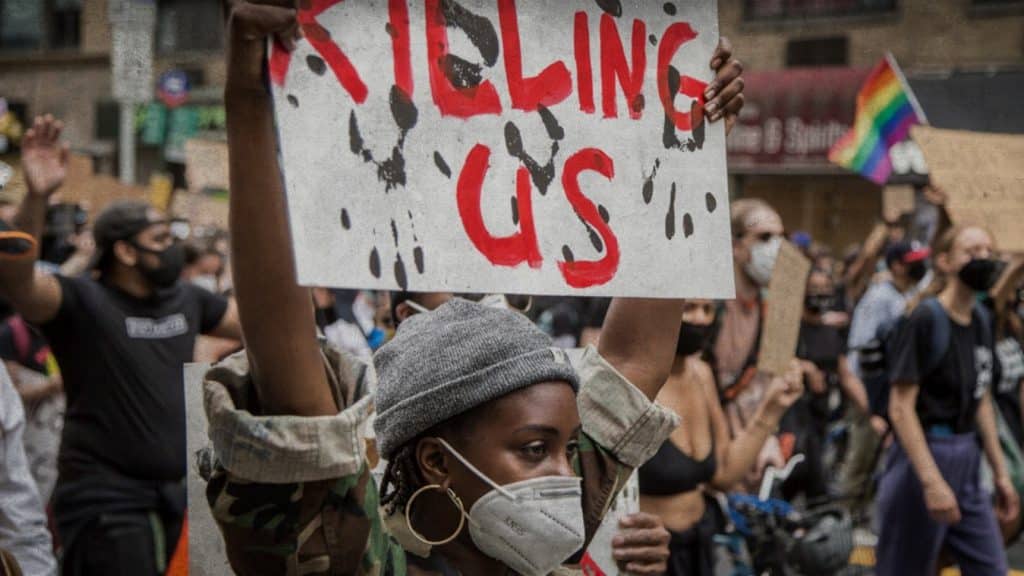
In a new report, the UN reveals that there are testimonies of black women who have been chained while giving birth in prisons in the United States, losing their babies in childbirth, which shows systematic racism in North American justice originated from slavery practices.
The document that detailed the violation of human rights in the United States declares that specialists «heard, first-hand, unbearable direct testimonies of pregnant women chained during childbirth who, due to chaining, lost their babies.»
They also collected testimonies from a Louisiana prison, where thousands of prisoners, mostly black men, were «forced to work in the fields (including picking cotton) under the surveillance of white men on horseback, in conditions very similar to 150 years ago.
The UN Expert Mechanism to Promote Racial Justice and Equality in Law Enforcement has highlighted the continued existence of racism in the United States, rooted in the history of slavery, the slave trade, and the hundred years of legalized apartheid that followed the abolition of slavery.
This phenomenon persists today in the form of racial profiling, police killings, and various human rights violations perpetuated by the United States justice system, according to the report.
Heartbreaking testimonies about racism in the United States
UN experts, following a visit in early 2023, point out that systemic racism against people of African descent permeates police forces and the criminal justice system in the United States. The report highlights the urgency of addressing this problem and calls on the country’s authorities to redouble their efforts to reform these institutions.
During the visit, the Expert Mechanism heard testimonies of 133 affected individuals, visited five detention centers, and held meetings with civil society groups as well as various government and law enforcement authorities in the District of Columbia, Atlanta, Los Angeles, Chicago, Minneapolis and New York.
«In every city we visited, we heard dozens of heartbreaking testimonies about how victims get neither justice nor reparation. This is not new, and it is unacceptable,» said a member of the Mechanism. Tracie Keesee added that this is «a systemic problem that requires a systemic response. All actors involved, including police departments and police unions, must join forces to combat the prevailing impunity.»
Afro-descendants in the US more prone to police violence
The report has shed light on deep racial disparities in law enforcement in the United States, highlighting that black people are three times more likely to be killed by police and 4.5 times more likely to be incarcerated compared to their white counterparts.
The document also highlights that of the more than 1,000 cases of homicides committed by police annually, only 1% result in charges being filed against the officers involved. Furthermore, it warns that, without substantial reforms in regulations on the use of force, these incidents will continue to proliferate.
«We reject the ‘bad apple’ theory,» said one expert, noting that there is strong evidence to suggest that abusive behavior by some police officers is part of a broader, more threatening pattern.
Juan Mendez, one of the authors of the report, emphasized that police and criminal justice institutions in the United States reflect and perpetuate values, attitudes and stereotypes of society, and demanded their immediate reform.
Concern for mental health of police officers
The report also raises concerns that armed officers should not be the default response to solving diverse social problems, such as mental health crises, homelessness and traffic enforcement or discipline in schools. In this sense, experts advocate the implementation of alternative responses to police intervention.
In a series of meetings with police officers, Tracie Keesee, spokesperson for the UN Expert Mechanism to Promote Racial Justice and Equality in Law Enforcement, expressed growing concern about the impact on officers’ mental health, attributed not only to work overload but also to racism and racial discrimination within police departments.
«Expecting law enforcement officers to respect and protect human rights also presupposes a culture of respect and well-being within the ranks”, Keesee emphasized during her remarks.
Additionally, alarming conditions were documented in a Louisiana prison, where thousands of inmates, mostly black men, were forced to work in fields, including picking cotton, under the supervision of white men on horseback, evoking conditions similar to 150 years ago.
The report from the center known as «Angola» called the accounts «shocking» and equated them to «contemporary forms of slavery». Experts expressed particular alarm over the widespread use of solitary confinement, disproportionately applied to black inmates. A black man reported being held in solitary confinement for 11 continuous years.
You can read: India demands a democratic, just and equitable world before the UN
Mendez stressed the «critical need for comprehensive reform» in the criminal justice system. The Mechanism condemned not only the excessive use of incarceration and penal supervision, but also the overrepresentation of Afro-descendants in this system.
You may be interested in: Longevity in Japan would become a serious social crisis
«The testimonies and figures we receive represent the brunt of a racist criminal justice system that erodes all efforts aimed at addressing systemic racism,» said Mendez, drawing attention to the urgency of addressing these human rights violations in an immediate and exhaustive manner.





